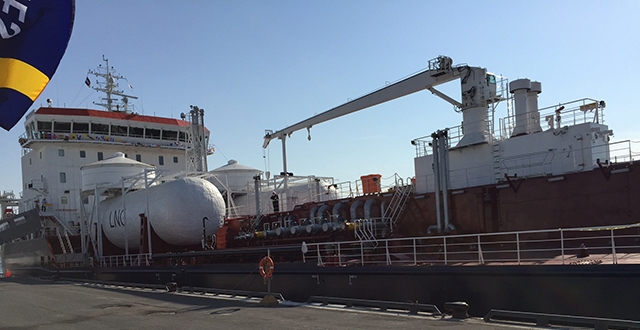A liquefied natural gas (LNG) supply solution available to all shipowners in Quebec

May 18, 2017 - Press releases
Montreal, May 18, 2017 – In the wake of the inauguration of M/T Damia Desgagnés, the very first Groupe Desgagnés vessel able to be fueled by liquefied natural gas (LNG), President and Chief Executive Officer of Gaz Métro, Sophie Brochu, and President and Chief Executive Officer of the Montreal Port Authority (MPA), Sylvie Vachon, praise Groupe Desgagnés' leadership and vision. By acquiring four vessels able to comply with the most stringent environmental standards, Groupe Desgagnés positions itself as a pioneer in its category for the development of LNG as a fuel for maritime transport in Quebec and Canada.
In response to this desire to opt for an eco-friendly fuel, Gaz Métro and the Port of Montreal also announce that an LNG supply solution for marine fuel will now be available at the Port of Montreal. Groupe Desgagnés, Gaz Métro and the Port of Montreal joined efforts in developing an LNG supply system that will be operated by a Gaz Métro subsidiary. This system will be available to all shipowners in Quebec, including the fleets passing through the Port of Montreal. In short, this is an important milestone for the entire maritime transport sector.
“I would like to commend the leadership and vision of Groupe Desgagnés, which was the first commercial shipowner to order vessels destined to navigate in Québec able to use LNG as marine fuel. Quebec can be proud to have Groupe Desgagnés among its visionary companies, as was the Société des traversiers du Québec. LNG is currently one of the best solutions available to replace petroleum products in the maritime sector, due to its environmental assets. In particular, it respects new Canadian and international maritime transportation standards that aim to minimize the emission of air pollutants [NOx and SOx],” said Sophie Brochu.
“I praise Groupe Desgagnés' forward thinking, which is very inspiring for Quebec's maritime industry,” emphasized Sylvie Vachon. “The Port of Montreal shares this vision to exercise positive leadership in sustainable development practices and, in this context, the LNG fuel supply solution that will be available on our docks is another significant and concrete action toward making commercial shipping even more environmentally friendly.”
Gaz Métro and the Port of Montreal hope that the availability of LNG supply solutions will be a first step in encouraging shipowners to follow the lead taken by Groupe Desgagnés and, in turn, move toward this efficient, cost-effective and clean option.
About LNG
When cooled to -160°C, natural gas changes from a gas to a liquid. In liquid form, it takes up 600 times less space than in its gaseous state. In the same space, it is therefore possible to store 600 times more energy with LNG than with natural gas in a gaseous state—a definite advantage in terms of transportation and storage. Liquefied natural gas comes from Gaz Métro's liquefaction plant in the East of Montreal, in operation for 45 years. Once liquefied, natural gas is stored in the plant's cryogenic tanks. The plant has two loading docks for filling tanker trucks, which supply refueling stations or service customers directly. LNG can then be distributed to customers within a radius of over 1,000 km from the LSR plant.
About Gaz Metro
With more than $7 billion in assets, Gaz Métro is a leading energy provider. It is the largest natural gas distribution company in Quebec, where its network of over 10,000 km of underground pipelines serves more than 300 municipalities and more than 205,000 customers. Gaz Métro is also present in Vermont, where it has more than 315,000 customers. There, it operates through its subsidiaries in the electricity production market and the electricity and natural gas distribution market. Gaz Métro is actively involved in developing and operating innovative, promising energy projects, including natural gas as fuel, liquefied natural gas as a replacement for higher emission-producing energies, the production of wind and solar power, and the development of biomethane.
About the Port of Montreal
Operated by the Montreal Port Authority (MPA), the Port of Montreal is the second largest port in Canada and a diversified transshipment center that handles all types of goods: containerized and non-containerized cargo, liquid bulk and dry bulk . It is a leading container port served by the largest container shipping lines in the world. The Port of Montreal has its own rail network directly dockside. It is connected to the two national rail networks and a highway system. The Port operates a passenger terminal. All other terminals are run by private stevedoring firms. Port activity supports 16,000 jobs and generates $2.1 billion in economic benefits annually.
Information:
Media
Geneviève Couture
Public Affairs and Communications
Tel.: 514 598-3449
For interview requests (Gaz Métro)
Camille Rochon
Tel.: 514 688-2519
[email protected]
Mélanie Nadeau
Director of Communications
Montreal Port Authority
Tel.: 514 283-7050
[email protected]
www.twitter.com/PortMTL
